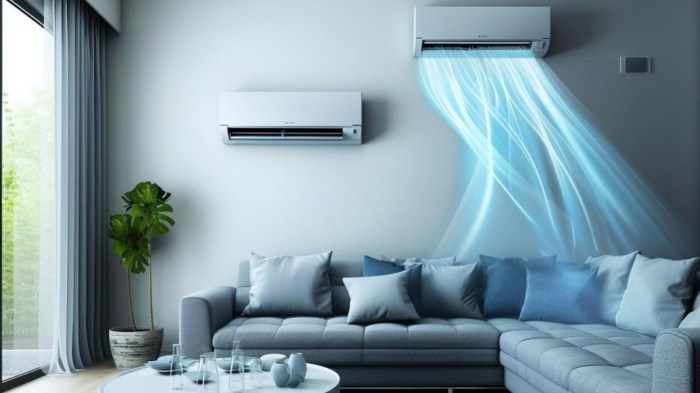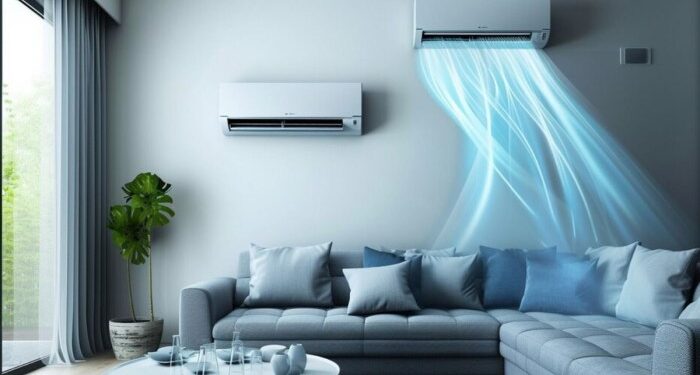As Best energy-efficient air conditioners for 2025 takes center stage, this opening passage beckons readers into a world crafted with good knowledge, ensuring a reading experience that is both absorbing and distinctly original. In the realm of air conditioning, energy efficiency is key to reducing electricity consumption and environmental impact.
Let's dive into the realm of cutting-edge cooling technologies that promise a greener and more cost-effective future.
Overview of Energy-Efficient Air Conditioners
Energy-efficient air conditioners are designed to consume less electricity while providing optimal cooling comfort. These units are important in reducing energy consumption, which not only benefits the environment but also leads to cost savings for users.
Key Features of Energy-Efficient Air Conditioners
Energy-efficient air conditioners come with specific features that set them apart from traditional models. These features include:
- Variable speed compressors that adjust cooling output based on the required capacity, reducing energy wastage.
- High energy efficiency ratios (EER) and seasonal energy efficiency ratios (SEER) which indicate the unit's efficiency in converting electricity into cooling power.
- Programmable thermostats that allow users to set temperature schedules, optimizing energy usage.
- Advanced filters that improve air quality and reduce strain on the system, leading to lower energy consumption.
Benefits of Using Energy-Efficient Air Conditioners
There are several benefits associated with using energy-efficient air conditioners:
- Reduced electricity bills due to lower energy consumption, especially during peak cooling seasons.
- Environmental benefits such as reduced greenhouse gas emissions and lower carbon footprint.
- Enhanced comfort and cooling performance without compromising on energy efficiency.
- Potential incentives and rebates from utility companies for using energy-efficient appliances.
Current Trends in Energy-Efficient Air Conditioners
With the increasing focus on sustainability and energy efficiency, the air conditioning industry is constantly evolving to meet the demand for more eco-friendly solutions. Let's explore some of the current trends in energy-efficient air conditioners.
Latest Technological Advancements
Energy-efficient air conditioners are incorporating advanced technologies such as inverter compressors, smart thermostats, and variable-speed fans. These innovations help optimize energy usage, resulting in lower electricity bills and reduced environmental impact.
Comparison with Traditional Air Conditioners
Traditional air conditioners operate on a fixed-speed compressor, leading to frequent on/off cycles and higher energy consumption. In contrast, energy-efficient models with inverter technology adjust the compressor speed based on cooling demand, providing consistent comfort with lower energy usage.
Regulations and Standards Driving Development
Government regulations and industry standards are pushing for the development of energy-efficient air conditioners. Programs like ENERGY STAR in the US set criteria for energy efficiency, encouraging manufacturers to enhance their products to meet these standards. Additionally, global initiatives to reduce carbon emissions are incentivizing the adoption of energy-efficient cooling solutions worldwide.
Key Factors to Consider When Choosing an Energy-Efficient Air Conditioner
When selecting an energy-efficient air conditioner, there are several key factors to consider to ensure optimal performance and energy savings. Proper installation and maintenance play a crucial role in maximizing the efficiency of the unit. Additionally, comparing different brands and models available in the market can help you make an informed decision on the best choice for your specific needs.
SEER Rating
The Seasonal Energy Efficiency Ratio (SEER) rating is an important factor to consider when choosing an energy-efficient air conditioner. A higher SEER rating indicates greater energy efficiency, which can lead to lower energy consumption and cost savings over time. Look for units with a SEER rating of 14 or higher for the best energy efficiency.
Size
The size of the air conditioner is another crucial factor to consider. An oversized unit will lead to frequent cycling on and off, reducing energy efficiency and causing unnecessary wear and tear. On the other hand, an undersized unit will struggle to cool the space efficiently.
Ensure you choose the right size air conditioner based on the square footage of the area you need to cool.
Type
There are different types of energy-efficient air conditioners available, including central air conditioning systems, ductless mini-split systems, and window units. Each type has its own advantages and disadvantages, so consider your specific requirements and constraints when choosing the type of air conditioner that best suits your needs.
Proper Installation and Maintenance
Proper installation by a qualified professional is essential to ensure the air conditioner operates efficiently. Poor installation can lead to air leaks, improper airflow, and reduced performance. Regular maintenance, such as cleaning or replacing filters, checking refrigerant levels, and inspecting ductwork, is also crucial for maximizing energy efficiency and prolonging the lifespan of the unit.
Comparison of Brands and Models
When comparing different brands and models of energy-efficient air conditioners, consider factors such as energy-saving features, warranty coverage, customer reviews, and pricing. Look for reputable brands known for producing high-quality, energy-efficient units and compare specifications to find the best option that meets your needs and budget.
Future Prospects for Energy-Efficient Air Conditioners by 2025

As we look ahead to 2025, the landscape of energy-efficient air conditioners is set to undergo significant changes driven by technological advancements and environmental concerns. Innovations in cooling technologies are expected to revolutionize the way we approach cooling our spaces, while challenges and opportunities will shape the adoption of energy-efficient air conditioners in the coming years.
Potential Innovations in Energy-Efficient Cooling Technologies
With a growing focus on sustainability and energy conservation, the future of energy-efficient air conditioners is likely to see the emergence of innovative technologies aimed at reducing energy consumption and environmental impact. Some potential innovations that could shape the future of cooling technologies include:
- Advancements in compressor technology to improve efficiency and reduce energy consumption.
- Integration of smart sensors and AI algorithms for optimized cooling based on occupancy and environmental conditions.
- Development of eco-friendly refrigerants with lower global warming potential.
- Enhanced heat exchanger designs for improved heat transfer and overall system efficiency.
Challenges and Opportunities for Adoption
The widespread adoption of energy-efficient air conditioners faces both challenges and opportunities in the upcoming years. While the benefits of energy efficiency are clear, barriers such as initial costs, lack of consumer awareness, and retrofitting existing buildings pose challenges to widespread adoption.
However, opportunities exist in the form of government incentives, increased consumer demand for sustainable products, and advancements in energy-efficient technologies.
Ending Remarks
In conclusion, the landscape of energy-efficient air conditioners for 2025 is filled with promise and potential. With a focus on innovation, regulations, and consumer awareness, we can expect a future where cooling our spaces is both efficient and environmentally friendly.
Stay tuned for the exciting developments that lie ahead in the world of air conditioning technology.
FAQ Resource
What is the SEER rating and why is it important when choosing an energy-efficient air conditioner?
The SEER rating stands for Seasonal Energy Efficiency Ratio and indicates the efficiency of an air conditioner. The higher the SEER rating, the more energy-efficient the unit is, leading to lower operating costs.
How can proper installation and maintenance impact the energy efficiency of an air conditioner?
Proper installation and regular maintenance are crucial for maximizing the energy efficiency of an air conditioner. Poor installation or lack of maintenance can lead to inefficiencies, higher energy consumption, and decreased cooling performance.
Are there government incentives available for purchasing energy-efficient air conditioners?
Yes, there are often government rebates or tax credits available for purchasing energy-efficient appliances, including air conditioners. It's worth checking with local and federal programs to see if you qualify for any incentives.















